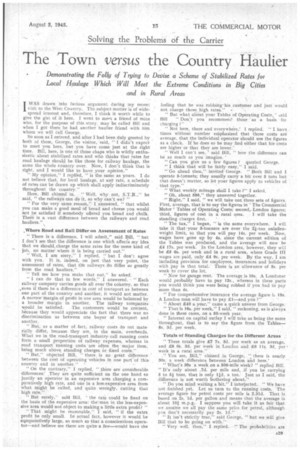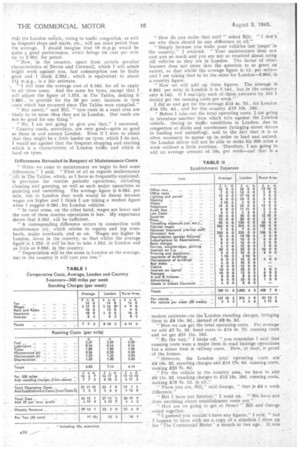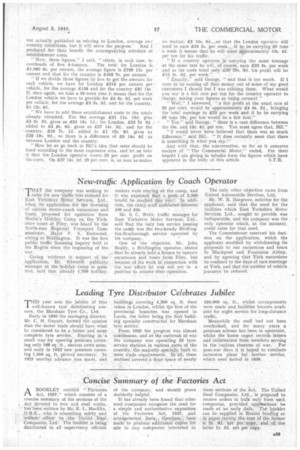Solving the Problems of the Carrier
Page 31

Page 32

Page 35

If you've noticed an error in this article please click here to report it so we can fix it.
The Town versus the Country Haulier • Demonstrating the Folly of Trying to Devise a Scheme of Stabilized Rates for Local Haulage .Which Will Meet the Extreme Conditions in Big Cities and in Rural Areas IWAS drawn into furious argument during my recent visit to the West Country. The subject matter is of widespread interest and, therefore, I think it worth while to give the gist of it here. I went to meet a friend of mine who, for the purpose of this story, may be called Bill and when I got there he had another haulier friend with him whom we will call George. So soon as I entered, and after I had been duty greeted by both of them, George, the visitor, said, " I didn't expect to meet you here, but you have come just at the right time. Bill, here, is one of those chaps who is wildly enthusiastic about stabilized rates and who thinks that rates for road haulage should be like those for railway haulage, the same the whole country over. Now, I don't think that is right, and I would like to have your opinion."
" My opinion," I replied, " is the same as yours. I do not believe that, for local haulage, at any rate, a schedule . of rates can be drawn up which shall apply indiscriminately throughout the country."
Here, Bill chimed in. , "Well, why not, S.T.R.," he said, "the railway's can do it, so why can't we? "
For the very same reason," I answered, " that whilst you can make a good meal'of bread and cheese you would not be satisfied if somebody offered you bread and chalk. Theie is a .vast difference between the railways and road
hauliers."
• Where Road and Rail Differ on Assessment of Rates
" There is a difference, I -will admit," said Bill, " but I don't see that the difference is one which affects my idea that we should. charge the same rates for the same kind of, job, no matter where it is being carried out."
" Well, I am sorry," I replied, " but I don't agree with you. It is, indeed, on just that very point, the assessment of rates, that the railways do differ so greatly from the road hauliers."
" Tell me how you make that out," he asked.
" I can do that in few words," I answered, "Each railway company carries goods all over the country, so that seven if there he a difference in cost of transport as between one part of the country and another, it would not matter. A narrow margin of profit in one area would be balanced by a broader margin in another. The railway companies ,
would be satisfied. The customers would be content, because they would appreciate the fact that there was no discrimination as between one buyer of transport and another.
" Bat, as a matter of fact, railway costs do not materiall3; differ, because they are, in the main, overheads, What we in the road-transport industry, call running costs form a small proportion of railway expenses, whereas in road transport running costs are often the. major item, being much above standing charges or fixed costs."
" But," objected Bill, " there is no great difference " between the cost of operating 'vehicles iO one part of this' country and in another." •
" On the contrary," I replied, " there are considerable -differences: They are quite sufficient on the one hand to justify an operator in an expensive area charging a comparatively high rate, and one in a less-expensive area from what might be called, and quite wrongly, cutting that high rate."
" But surely," saki Bill, ' the rate could be fixed on the basis of the expensive area: the man in the less-expensive area would not object to making a little extra profit? "
" That might he reasonable," I said, " if the extra profit he only small. In actual fact, however it would be cqmparatively large, so much so that a conscientious, operator—and believe me there are quite a few—would have the feeling that he was robbing'his customer and just would not charge those_ high rates."
" But what about your Tables of Operating Costs,' aaid Bill " Don't you recommend those as a basis for charging ?"
" Not here, there and everywhere,' I replied. " I have times viithout number emphasized that those costs are average, that the individual operator should use the figures as a check. If he does so he may find either that his costs are higher or that they are lower.'
" Well I can't see, ' said Bill, " how the difference can be as much as you imagine. '
" Can you give us a few figures ? queried George.
" I think that will he fairly easy," I said.
" Go ahead then," invited George. " Both Bill and I operate 5-tonners; they usually carry a bit over 5 tons but that doesn't matter, so let your figures apply to vehicles of that type."
"What weekly mileage shall I take ?" I asked.
"Oh, about 500," they answered together.
"Right," I said, " we will take out three sets of figures. First, average, that is to say -the figures in The Commercial Motor' Tables of Operating Costs; second, London figures;
third, figures of cost in a rural area. I will take the standing charges first.
" The tax," I began, " is the same everywhere. I will take it that your 5-tonners are over the 2i-ton unladenweight limit, so that you will pay 14s, per week. Now, wages have gone up by 4s, since the current edition of the Tables was produced, and the average will now be £4 17s. per week. In the London area, however, they will be £5 6s. per week and in a rural area, where Grade III wages are paid, only £4 9s. per week. By the way, I am including provision for employees, insurances and holidays with Pay in that total. There is an allowance of Ss. per week to cover the lot.
" Now for garage rent. The average is 10s. A Londoner would probably have to pay 12s„ whereas in these parts you would think you were being robbed if you had to pay more than 4s, " For comprehensive' .insurance the average figure h. !Ss.
A London man will have to pay 21—and you ?" '
• " About £46 a year," came a quick answer from George. "That is 16s. per week," I said, " reckoning, as is always done in ahese cases, on a 50-week year.
" Interest on capital outlay I wilt take as being the same throughout, that is to say the figure from the Tables-Ss. 3d. per week.
Totals of Standing Charges for the Different Areas
" These totals give £7 7s. 3d. per week as an average, and 28 OS. 3d. per Week in London and £6 I Is. 3d, per week in a rural area."
" You see, Bill," chimed in George, ". there is nearly 30s, a week difference between London and here.' ,
" What's 309 a week on a 500-mile Week? " replied Bill. "It's only about .7d. per mile and, .if you be carrying 5 to 5 tons, that is only 11d. a ton. Just as I 'said, the difference is not worth bothering about."
" Do you mind waiting a bit," I interjected. " We have not finished yet. Let us turn to the running costs. The average figure for petrol costs per mile is 2.31d. That is based on 2s. Id. per gallon and means that the average is about 101 m.p.g. I suppose you will take it as fair that we assume we all pay the same price for petrol, although you don't necessarily pay 2s. Id."
" It isn't strictly true," said George, " but we will give Bill that to be going on with."
" Very well. then," I replied. " The probabilities are that the London vehicle, owing to traffic congestion, as well as frequent stops and startS, etc., will use more petrol than the average. I should imagine that 10 m.p.g) would be quite a good performance, which brings his cost per mile up to 2 50d. for petrol.
" Now, in the country, apart from certain peculiar characteristics of Devon -and Cornwall, which I will admit might work against you, fuel consumption can be fairly good and I think 2.20d., which is equivalent to about 111 m.p.g., is a fair estimate.
" I will take the average cost of 0.16d. for oil to apply to all three cases. And the same for tyres, except that I will 'adjust the figure of 1.57d, in The Tables, making it 1.88d , to provide for the 20 per cent, increase in tyre costs which has occurred since The Tables were compiled."
" But surely," said Bill, " tyre costs in a rural area are likely to be more than they are in London. Our roads are not -so good for one thing."
" No, I am not going to give you that," I answered.
Country roads, nowadays, are very good-quite as good as those in and around London. Even if I were to admit that they might be a little harder on tyres, which I do not, I would set against that the frequent stopping and starting which is a characteristic of London traffic and which is hard on tyres.
Differences Revealed in Respect of Maintenance Costs " When we come to maintenance we begin to. find some differences," I said. " First of all as regards maintenance (d) in The Tables, which, as I have so frequently. explained, is provision for routine periodic operations, including cleaning and greasing, as well as such major operations as painting and varnishing. The average figure is 0.26d. per mile, but in London that work would be dearer because wages are higher and I think I am taking a modest figure when I suggest 0.28d. for London vehicles.
" In rural areas, on the other hand, wages are lower and the cost of these routine operations is less. My experience shows that 0.20d, will be sufficient.
" A corresponding difference occurs in connection with mairftenance (e), which relates to repairs and top overhauls, major overhauls, and so on. Wages are higher in London, lower in the country, so that whilst the average figu-r-eis 1.22d. it will be fair to take 1.32d: in London and as little as 0.90d. in the country.
" Depreciation will be the same in London as the average, but in the country it will cost you less." " How do you make that out? " asked " 1 don't see why there should be any difference at all." " Simply because you make your vehicles last longer in the country," I retorted. " Your maintenance does not cost you so much and you are not so troubled about using old vehicles as they are in •London. The factor of obsolescence does not enter into the question to so great an extent, so that whilkt the average figure is' Id. per mileand I am taking that to be the same for London--0.80d. is a country figure. " Now we will add up these figures. The average is 6.83d. per mile; in London it is 7.14d., but in the cotintry only 6.14d. If I multiply each of those amounts by 50i) I should get the running costs per week."
I did so and got for the average 214 4s. 7d., for London £14 17s. 6d., and for the country 212 15s. 10d.
" Before I take out the total operating costs, I am going to introduce :another item which tells against the London vehicle. Owing to traffic conditions in London, due to congestion at docks and warehouses (bringing about delays in loading and unloading), and to the fact that it is so often necessary to queue up in order to load and unload, the London driver will not be able to make his 500 miles a week without a little overtime, Therefore, I am going to add an average amount of 10s. per week-and that is a modest estimate-to the London standing charges. bringing them to 28 los. 34., instead of 28 Os. 3d.
" Now wg can get the total operating costs. For average we add 27 7s. 3d. fixed costs to 214 4s. 7d, running costs and we get 221 us. 10d.
By the way," I broke off, " you remember I said that running costs were a major item in road haulage operations but a minor item in railway costs. Here, at least, is proof of the former.
• " HOwever, the London total operating costs are' £8 10s. 3d. standing charges and 2.14 17s. 6d. running costs, making £23 7s. 9d.
For the vehicle in the country area, we have to add 26 us. 3d. standing charges to 212 15s. 10d. running costs, snaking 219 7s. Id. in all."
" There you are, Bill," said George, " that is 24 a week difference."
"But I have not finished," I went on. "We have not done anything about establishment costs yet."
" How are we going to get at those? " Bill and George asked together. • I guessed you wouldn't-have any figures," I said, " but I happen to have with me a copy of a schedule I drew up for ' The Commercial Motor ' a month or two ago. It was not actually published as relating to London, average and country conditions; but it will serve the purpose.' And 1 produced for their benefit the accompanying schedule of establishment costs. .
" Now, these figures," I said, " relate, in each case, to overheads of five 5-tonners. The total for London is £1,080 6s. per annum, the average figure is 2789 ifs, per annum and that for the country is £408 7s. per annum.
" If we divide those figures by five to get the amount for each vehicle, we have for London £216 per annum per vehicle, for the average £158 and for the. country £81 14s If, (inee again, we take a 50-week year it meanS that for the London vehicle we. have to provide for 24 6s. Od. pir week per vehicle, for the average 23 3s. 3d and for the country, £1 12s, 8d.
" We have to add these establishment costs to the totals already obtained. For the average 221 lls. 10d. plus • 23 Sc 3d. gives us £24 15s, id.; for London. £23 7s 9d • added to £4 6s. 6d. gives us £27 14s. 3d.. and for the country, £19 7s, ld. added to 21 125. 8d. gives us 220 19s. 9d., so there is a difference of £6 145. 6d as
between London and the country. . • "Now let us go back to Bill's idea that rates should be fixed according to the most expensive area, and let us take it that the London operator wants 20 per cent profit on his costs. On 227 14s. 3d. 20 per cent, is, as near as makes no matter, 25 10s. 9d.. .so that the London operator will • need to earn £33 Sc. per week... If he be carrying 50 tons a week it means that he will want approxiMately 13s. 4d, per ton for his traffic, .• . •
" If a country operator is. carrying the same tonnage • at the same rate he will, of course, earn 233 5s, per. week and as his costs. total only. £20 119s, 9d. his profit will be £12 5s., 3d, per week."
" Exactly," said George, "and that is too much. If I were to be earning all that money out of some of my good customers I should feel I was robbing them; What would you say is a fair rate per ton for the conntry operator to charge, taking your figures as being correct? "
" Well," I answered, ".a fair profit at the usual rate of 20 per cent, would be approxiniately £4 Os. Sd., bringirig the 'total 'earnings to 125 per week and if he be carrying 50 tops 10s.. .per ton Would be a fair rate."
" Yes," said George, " there is a vast difference between the 10s. and 13s-. 4d. per ton. You must agree that, Bill."
" I would never have believed that there was so much difference," said Bill. "It does certainly seem that there
is something in what. you say.'' •
. And with that, the conversation, so far as it concerns readers of " The Commercial Motor," ended,. For their benefit I am giving in tabular form the figures which have appeared in the body of this article. S.T.R.




















































